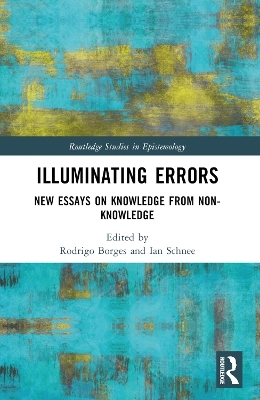
Illuminating Errors
Routledge (Verlag)
978-0-367-63303-5 (ISBN)
- Lieferbar (Termin unbekannt)
- Versandkostenfrei innerhalb Deutschlands
- Auch auf Rechnung
- Verfügbarkeit in der Filiale vor Ort prüfen
- Artikel merken
There is a nascent literature in epistemology about the possibility of inferential knowledge based on premises that are, for one reason or another, not known. The essays in this book explore if and how epistemology can accommodate cases where knowledge is generated from something other than knowledge. Can reasoning from false beliefs generate knowledge? Can reasoning from unjustified beliefs generate knowledge? Can reasoning from gettiered beliefs generate knowledge? Can reasoning from propositions one does not even believe generate knowledge? The contributors to this book tackle these and other questions head-on. Together, they advance the debate about knowledge from non-knowledge in novel and interesting directions.
Illuminating Errors will be of interest to researchers and advanced students working in epistemology and philosophy of mind.
Rodrigo Borges is a Lecturer at the University of Florida. He works mainly in epistemology. He is currently working on a monograph about the Gettier Problem and knowledge. Ian Schnee is an Associate Teaching Professor at the University of Washington. He is the author of The Logic Course Adventure, an interactive textbook for formal logic courses. Besides epistemology, his research interests include philosophy of film, philosophy of video games, and pedagogy.
Introduction Rodrigo Borges and Ian Schnee Part 1: The Possibility of Knowledge from Non-Knowledge Section 1: Justification and Essential Falsehoods 1. Norms of Belief and Knowledge from Non-Knowledge E.J. Coffman 2. We Are Justified in Believing that KFK is Fundamentally Wrong Peter D. Klein 3. No Knowledge From Falsity Fred Adams 4. Harmless Falsehoods Martin Montminy 5. Knowledge from Blindspots Rhys Borchert, Juan Comesaña, and Timothy Kearl Section 2: Gettier, Safety and Defeasibility 6. Knowledge from Error and Anti-Risk Virtue Epistemology Duncan Pritchard 7. Epistemic Alchemy? Stephen Hetherington 8. The Benign/Malignant Distinction for False Premises Claudio de Almeida 9. Knowledge, Falsehood, and Defeat Sven Bernecker Part 2: Beyond the Possibility of Knowledge from Non-Knowledge Section 3: Reasoning, Hinges and Cornerstones 10. The Developmental Psychology of Sherlock Holmes: Counter-Closure Precedes Closure Roy Sorensen 11. Inferential Knowledge, Counter Closure, and Cognition Michael Blome-Tillmann and Brian Ball 12. Knowledge from Non-Knowledge in Wittgenstein’s On Certainty: A Dialogue Michael Veber 13. Vaults Across Reasoning Peter Murphy 14. Entitlement, Leaching and Counter-Closure Federico Luzzi Section 4: Knowledge: From Falsehoods and of Falsehoods 15. Why is Knowledge from Falsehood Possible? An Explanation John Turri 16. The Assertion Norm of Knowing John Biro 17. Knowledge Without Factivity Kate Nolfi 18. Knowing the Facts, Alternative and Otherwise Clayton Littlejohn
| Erscheinungsdatum | 23.08.2024 |
|---|---|
| Reihe/Serie | Routledge Studies in Epistemology |
| Verlagsort | London |
| Sprache | englisch |
| Maße | 152 x 229 mm |
| Themenwelt | Geisteswissenschaften ► Philosophie ► Erkenntnistheorie / Wissenschaftstheorie |
| Geisteswissenschaften ► Psychologie | |
| ISBN-10 | 0-367-63303-5 / 0367633035 |
| ISBN-13 | 978-0-367-63303-5 / 9780367633035 |
| Zustand | Neuware |
| Haben Sie eine Frage zum Produkt? |
aus dem Bereich

![Was heißt Denken?. Vorlesung Wintersemester 1951/52. [Was bedeutet das alles?] - Martin Heidegger](/media/113619842)
